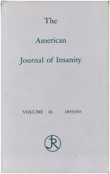Hypokalemia in outpatients with eating disorders
Abstract
OBJECTIVE: The literature on the prevalence and importance of hypokalemia in persons with eating disorders in contradictory and confusing. The authors investigated the frequency of hypokalemia and its relationship to symptoms in a group of outpatients with eating disorders. METHOD: Diagnostic evaluations and electrolyte studies were performed for 945 outpatients meeting the DSM-III-R criteria for eating disorders at the time of their intake evaluations at a suburban clinic for eating disorders. RESULTS: Clinically significant hypokalemia was comparatively rare. A total of 43 subjects (4.6%) were hypokalemic; of these, seven (0.7% of all subjects) were borderline hypokalemic (serum potassium = 3.4 mmol/liter). The hypokalemic subjects had a significantly lower mean weight and body mass index at entry than the normokalemic subjects. Significantly more of the hypokalemic subjects purged by abusing laxatives, either alone or with vomiting. The patients with restricting (nonpurging) anorexia nervosa, even those whose weights were very low, were generally normokalemic. CONCLUSIONS: The low frequency of hypokalemia in this group of eating disordered outpatients suggests that routine electrolyte determination is a poor screening tool for occult or denied bulimia. Hypokalemia occurred almost invariably in lower-weight bulimic (or anorectic/bulimic) patients who were vomiting and/or abusing laxatives. Indeed, the study suggests that hypokalemia in a patient with an eating disorder is virtually certain evidence that the patient is purging at least daily. In addition, it appears that a patient with purely restricting anorexia nervosa is not at risk for hypokalemia even if his or her weight is very low.
Access content
To read the fulltext, please use one of the options below to sign in or purchase access.- Personal login
- Institutional Login
- Sign in via OpenAthens
- Register for access
-
Please login/register if you wish to pair your device and check access availability.
Not a subscriber?
PsychiatryOnline subscription options offer access to the DSM-5 library, books, journals, CME, and patient resources. This all-in-one virtual library provides psychiatrists and mental health professionals with key resources for diagnosis, treatment, research, and professional development.
Need more help? PsychiatryOnline Customer Service may be reached by emailing [email protected] or by calling 800-368-5777 (in the U.S.) or 703-907-7322 (outside the U.S.).



